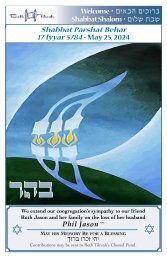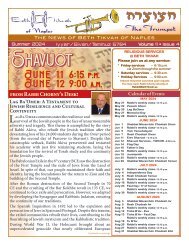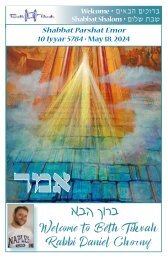You also want an ePaper? Increase the reach of your titles
YUMPU automatically turns print PDFs into web optimized ePapers that Google loves.
Welcome • ohtcv ohfurc<br />
Shabbat Shalom • ouka ,ca<br />
Shabbat Parshat Sh’lach<br />
23 Sivan 5784 • June 29, 2024<br />
jka<br />
A<br />
We extend our congregation’s sympathy to the family of<br />
Dorothy Scott k ”z<br />
May her Memory Be for a Blessing<br />
lurc vrfz hvh<br />
Contributions may be sent to Beth Tikvah’s Chesed Fund.<br />
A
Yahrtzeiten<br />
June 30<br />
July 2<br />
July 3<br />
July 5<br />
Anniversaries<br />
June 26 Doris & Lewis Baum (66)<br />
vfrck oburfz<br />
June 29 • 23 Sivan Norman Antzis – Father of Debra Antzis<br />
July 1 • 25 Sivan Judith Brown – Mother of Jack Brown<br />
Etta Agronin<br />
– Mother of Ron Agronin<br />
July 2 • 26 Sivan Fran Wallack – Mother of Sharon Zoldan<br />
Aaron (Pete) Lebowitz – Father of Ron Lebowitz<br />
July 5 • 29 Sivan Joseph Miller – Husband of Roberta MIller<br />
Birthdays<br />
jna `skuv ouh<br />
Sarah Castro<br />
Jay Kaye, Rabbi Ammos Chorny, Lawrence Macks<br />
Michael Sobol<br />
Lynn Nemes, Ilya Prizel<br />
Shabbat Kiddush Sponsored by:<br />
Aviva Chorny<br />
In honor of her husband’s birhtday<br />
cuy kzn<br />
Sponsor a<br />
Kiddush<br />
Contact Arleen Sivakoff:<br />
dsivakoff@aol.com • 239.455.8811
Torah & Haftarah Readings:<br />
Shabbat Sh’lach: Numbers 14:8–15:7 (Cycle 2) (Etz Hayim p. 845)<br />
1. 14:8-10 2. 14:11-20 3. 14:21-25 4. 14:26-38<br />
5. 14:39-42 6. 14:43-15:3 7. 15:4-7 M. 15:37-41 (p. 854)<br />
Haftarah: Joshua 2:1–24 (p. 857)<br />
Torah Commentary<br />
D’var Torah:<br />
The Retelling – Bex Stern-Rosenblatt<br />
We do not receive our death sentence lying down. We won’t accept it. We<br />
will not disappear. When the spies come back with their bad report of the<br />
treacherous land and difficult peoples, we pragmatically make a plan. If<br />
God is taking us to die in this land promised to us, we won’t go. God could<br />
have saved us the trouble of the journey and killed us off in Egypt or here in<br />
the desert. So we’ll go back, we’ll return to Egypt.<br />
As it turns out, that is not an option. For a second time in just a few verses,<br />
we receive another death sentence. Not only will God kill us off, God will<br />
leave our corpses to decompose in the desert. After the care we took to<br />
bring Jacob and then Joseph’s bodies home, our bodies will never enter the<br />
promised land.<br />
This does not work for us either. We came all this way. We want to come all<br />
the way home. We belong in the land promised to us. Surely, surely, God<br />
will give us another chance. In defiance of God’s decree, we get up and go<br />
to Canaan. We pray with our feet, we attempt to create facts on the ground.<br />
But God is not with us. And we are utterly destroyed by the Canaanites.<br />
However, when our bodies fall in this battle, they fall in Canaan. We come<br />
home. We die here defying God’s decree. We may not be able to overturn<br />
it. Yet we sacrifice ourselves in order to prove our devotion to the idea of<br />
return. We sacrifice ourselves because we believe in second chances. We<br />
sacrifice ourselves to prove to God that we want to come home.<br />
The word “sacrifice” is particularly apt here. When we decide to make a<br />
break for Canaan, the verse reads as follows: ‘And they rose early in the<br />
morning and they went up to the top of the mountain saying, “Behold,<br />
here we are. Let us go up to the place which God said to us for we have<br />
sinned.”’ This verse echoes the Akeda, where we read, ‘And God said to him,<br />
“Abraham. And he said, “Behold, here I am.” And he said, “Take now your
son, your only one, whom you love, Isaac, and go to the land of Moriah.<br />
And bring him up there as a burnt offering on one of the mountains which<br />
I will say to you.” And Abraham rose early in the morning.’<br />
God tests Abraham, telling him to sacrifice his son, before ultimately saving<br />
him and making big promises of land and progeny. In our parashah, we<br />
cannot but hope that God is testing us again. God tells us that we will not<br />
enter the land. God decrees death for us. So we reenact the Akeda. We get up<br />
early in the morning and go to the mountain, looking for God. And where<br />
we were hoping to meet a ram in the bushes, we meet the Amalekites and<br />
Canaanites. We cannot force God’s hand. This was not a test, this was not a<br />
second opportunity. This was a final decree. And this is the tragic difference<br />
between the Akeda and our punishment after the sin of the spies.<br />
But there is another difference between these two stories. In the Akedah,<br />
the father is commanded to kill his son, to erase the future. In our story,<br />
our children are already going to be ok. Our people’s future in the land is<br />
assured. We fight in our story only for our generation. We fight so that our<br />
graves will be somewhere our children can visit. We fight because a single<br />
generation still matters, even if the long term future of our people is assured.<br />
We fight because we never give up hope, we assume the best of God and of<br />
ourselves. Even when God denies us a second chance, we still grant one to<br />
ourselves.<br />
Join ✺ Rabbi Chorny<br />
for his weekly discussion<br />
group, Tuesdays at<br />
12:15 p.m. via<br />
and IN Person<br />
Beth Tikvah of Naples<br />
1459 Pine Ridge Road<br />
Naples, FL 34109<br />
239 434-1818<br />
Visit us online at<br />
bethtikvahnaples.org<br />
or scan the QR code

















